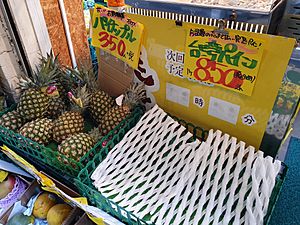Freedom pineapples facts for kids
Quick facts for kids Freedom pineapples |
|||||||
|---|---|---|---|---|---|---|---|
| Traditional Chinese | 自由鳳梨 | ||||||
| Simplified Chinese | 自由凤梨 | ||||||
|
|||||||
| Alternative Chinese name | |||||||
| Traditional Chinese | 自由菠蘿 | ||||||
| Simplified Chinese | 自由菠萝 | ||||||
|
|||||||
Freedom pineapples (Chinese: 自由鳳梨) became a special phrase in 2021. It describes a big effort to help pineapple farmers in Taiwan. This happened after China stopped buying pineapples from Taiwan. The idea was to encourage people in Taiwan and other countries to buy more Taiwanese pineapples. This would help make up for the money lost from China's ban.
What Are Freedom Pineapples?
In March 2021, the government of mainland China stopped all pineapple imports from Taiwan. They said they found harmful bugs in some fruit shipments. This was a big problem for Taiwan. Before the ban, over 90% of all pineapples Taiwan sold to other countries went to China.
Why the Ban Happened
The Chinese government said the ban was because of "biosecurity concerns." This means they were worried about pests or diseases that could harm their own plants. However, the Taiwanese government disagreed. They said their pineapples were safe and questioned China's reason for the ban. This situation is part of the ongoing relationship between China and Taiwan, sometimes called "Cross-Strait relations."
How Taiwan Responded
After the ban, the Taiwanese government asked its own people and friendly countries to help. They encouraged everyone to buy more Taiwanese pineapples. They also promised to help farmers who lost money because of the ban.
Taiwan's Foreign Minister, Joseph Wu, started the "Freedom Pineapple" campaign on social media. The name "Freedom pineapples" is a fun way to say "Freedom fries." This phrase was used in the United States many years ago to show support for a country.
What Happened Next
Even with all the support, Taiwan's pineapple exports dropped a lot. In 2021, Taiwan sold 28 million metric tons of pineapples to other countries. This was much less than the 51 million metric tons they sold in 2019. The campaign helped, but it couldn't completely fix the economic problems caused by the ban.


